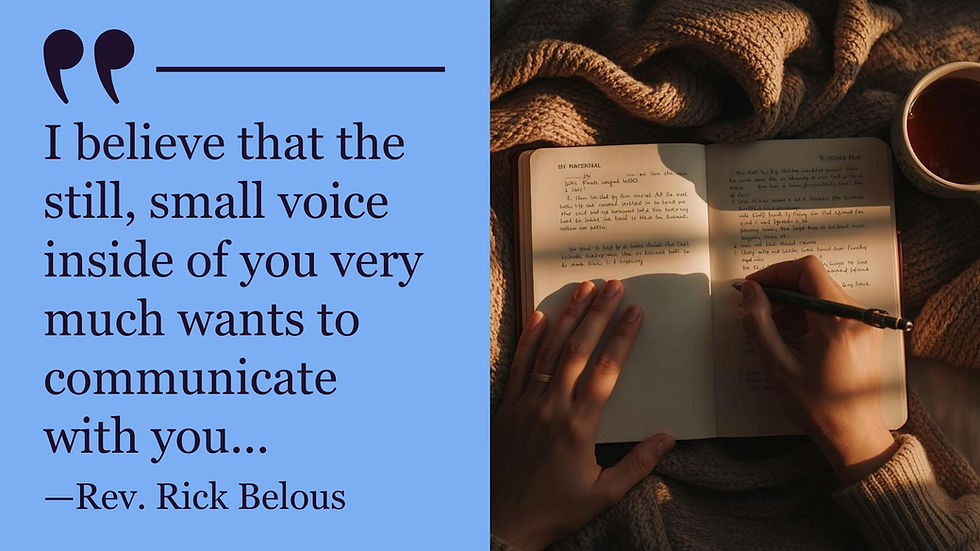Then Along Came Squanto
- Rev. Richard Belous

- Nov 24, 2025
- 4 min read

Remember that it was the Pilgrims’ original game plan to settle in the relatively balmy climate, and certainly fertile soil, of the Colony of Virginia.
But as the old saying goes: ”If you want to make God laugh, tell him your long run plans.” In the Atlantic crossing, the Mayflower was blown off course, and the ship was pushed to the rocky and cold shores of what became New England.
It is shocking to think that less than 20 percent of the Pilgrims were really bona fide farmers, and farming equipment aboard the Mayflower was scanty at best. On top of this, the farming almanacs that the Pilgrims had were, of course, based on conditions in “Merry Olde England.”
New England soil and climate meant that planting times were radically different from the old country, and the plants that would be hardy and thrive were not the same as along the Thames and Avon rivers.
Is it any wonder that so many Pilgrims died during their first winter in the New World. Accounts vary slightly, but most reliable historical sources agree that nearly half of the Mayflower passengers died, primarily from exposure, malnutrition, disease, and inadequate shelter in their first harsh New England winter.
Meanwhile, the Native Americans kept away from the Pilgrims, and the Pilgrims kept away from the Native Americans. However, the Pilgrims were really on the ropes, and they appeared ready for the knockout punch.
Now picture this. Several Pilgrims were on the beach when this Native American walked up to them showing the universal sign of peace. If this was not unusual enough, the Native American started talking to the white settlers in perfect English!! You know how amazing this seemed to the Pilgrims?
Let me put the scene in modern context. It’s a few years from now, and we have launched astronauts to Mars. It’s not going too well, and it looks like the astronauts are all going to die before an Earth-based rescue mission can reach the red planet.
But just when all hope seems to be lost, the astronauts spot a green Martian walking up to them showing the universal peace sign. This Martian is wearing a San Francisco Giants’ baseball cap, and he says to the astronauts in perfect English, “I love the Giants. Do you have any Barry Bonds baseball cards I could look at?”
That Native American was Squanto, and he proved to be a godsend to the Pilgrims. Squanto was from the Patuxet tribe. An earlier English explorer had captured Squanto and took him to Spain, where he was sold into slavery.
Squanto then managed to escape, likely with the help of Catholic friars. Eventually he reached England, where he learned English and later returned to North America.
When he returned to New England, Squanto searched for his tribe and home. But what he found was devastating. His people and their communities were almost wiped out because of diseases carried over to the New World by the Europeans.
Put yourself in Squanto’s moccasins: Captured and sold into slavery; and you come back and find out that the majority of your people are dead and gone. Your tribal communities are now in ruins. I think many would say, “I am going to kill every one of those white devils that I can get my hands on.”
But that was not Squanto’s way. Despite all that had happened to him, his way was one of peace, forgiveness, and reconciliation. He worked at it both within himself and within the Native American and European settler communities.
Squanto taught the Pilgrims how to really fish and hunt in the New World. He taught them how to farm. He showed them what to plant and when to plant it. He also taught the Pilgrims that it was a wise thing to bury a fish or two in some of the rows of crops. “Don’t forget to make an offering to the Great Spirit,” he would say. Yes, fertilize the crops with faith.
The Pilgrim children loved Squanto. He also served as a liaison and interpreter in negotiations between the Pilgrims and the regional Wampanoag tribes.
Squanto played a crucial and multifaceted role in the first Thanksgiving, acting as an interpreter, guide, agricultural advisor, and intermediary between the Pilgrims and local Native American tribes. Without his assistance, the survival of the English settlers at Plymouth would have been far less likely.
This Thanksgiving, given all that is happening in the world, I think it would be wise if we could all think about how we can be more like Squanto. How can we look inside of ourselves to find more forgiveness, internal peace, and serenity?
How can we be peacemakers and bridge builders bringing different peoples together for a world that works for all? How can we help the next generation to grow and help them to solve problems that have battled our generation?
Yes, how can we be more like Squanto? And may we recognize the Squantos in our lives.
Happy Thanksgiving,
Rev. Rick





